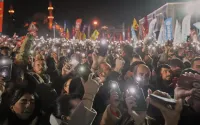15 September 2005Znet
"The specter of Vietnam has been buried forever in the desert sands of the Arabian peninsula," President George H. W. Bush said of the Gulf War victory in early 1991. He told a gathering of state legislators, "It's a proud day for America -- and, by God, we've kicked the Vietnam syndrome once and for all."
Often discussed by news media, the "Vietnam syndrome" usually has a negative connotation, implying knee-jerk opposition to military involvement. Yet public backing for a war has much to do with duration and justification. A year after the invasion of Iraq began, Noam Chomsky observed: "Polls have demonstrated time and time again that Americans are willing to accept a high death toll -- although they don't like it, they're willing to accept it -- if they think it's a just cause. There's never been anything like the so-called Vietnam syndrome: it's mostly a fabrication. And in this case too if they thought it was a just cause, the 500 or so [American] deaths would be mourned, but not considered a dominant reason for not continuing. No, the problem is the justice of the cause."
Overall, if history is any guide, most Americans are inclined to favor just about any war after it starts -- in the short run -- but if the war drags on and loses its rationale in the public mind, support is apt to plummet. "World War II support levels never fell below 77 percent, despite the prolonged and damaging nature of the conflict," writes Chris Hedges in his book "What Every Person Should Know About War." In contrast, he adds, "the Korean and Vietnam Wars ended with support levels near 30 percent." The American public's initially high levels of support for the Iraq war have fallen sharply as bloodshed continues and Washington's prewar lies become more apparent. In a recent poll conducted by CNN, USA Today and the Gallup organization, 54 percent of respondents said that the United States made a mistake in sending troops to Iraq.
[ You fight them ]
Thirty-five years before President George W. Bush assured the American public that like-minded Iraqis would take up the burdens of fighting and dying as the occupation of their country wore on, President Richard Nixon unveiled a doctrine envisioning that more soldiers of Asian allies would die in place of American troops.
During a visit to Guam in July 1969, Nixon announced that the U.S.government "would furnish military and economic assistance when requested in accordance with our treaty commitments. But we shall look to the nation directly threatened to assume the primary responsibility for its defense." A year after Nixon proclaimed his ballyhooed doctrine, amounting to let's-you-and-them-fight, I. F. Stone wrote: "White House briefers speak of abandoning our world policeman role, but the alternative they offer is not a revitalized U.N. but the so-called Guam Doctrine. This is imperialism by proxy. We may be on the verge of imposing quotas against the Orient's low-wage textiles but we are eager to buy its low-wage soldier-power. The Guam Doctrine will be seen in Asia as a rich white man's idea of fighting a war: we handle the elite airpower while coolies do the killing on the ground."
To ease stateside worries about U.S. troops being entangled in continuing warfare, the White House is eager to convey that the military burden will increasingly rest on the broadening shoulders of the people who live in the country at stake. Yet Stone's July 1970 essay concluded presciently: "Not enough Asians are going to fight Asians for us even if the price is right."
A third of a century after Stone's prediction, an observer of the war in Iraq would have a strong basis to forecast that "not enough Arabs are going to fight Arabs for us." After disbanding Saddam Hussein's army, the Pentagon tried to build a new one, but a year into the occupation the recruit numbers were low -- just 10 percent of the 40,000 target level. After half of the initial battalion quit in December 2003, a pay raise helped in retaining soldiers. Nevertheless, the occupying authorities were let down the following spring, as the Wall Street Journal reported: "When the second battalion was pressed last week to fight Sunni insurgents alongside Marines ... in Fallujah, soldiers refused, saying they had signed up to defend Iraq from foreign threats, not fight fellow Iraqis."
[ Democracy versus policy ]
In effect, condemnations of "the Vietnam syndrome" attempt to promote the legitimacy of at least two wars at once -- the past one in Vietnam and the war that's currently underway (or future wars). To boosters of U.S. military intervention, the United States will triumph if only it is willing to show enough resolve.
But the U.S. government's problems in Iraq after the invasion, as in Vietnam, are intimately related to the basic realities -- and the actual merits -- of the war itself. The eagerness of so many supposed beneficiaries of American intervention to eject the occupiers was pivotal, not coincidental: It corresponded to the weakness of the U.S. warmakers' position in multiple, concentric ways. At the core of the war's long-term lack of viability (or "winnability") was the hollowness of Washington's claims, not the least of which were -- and are -- the pretensions of benevolence and zeal to foster a new democratic government for the benighted land.
Rhetoric aside, democracy in Iraq would run counter to U.S. policy priorities. "From the start," the Wall Street Journal noted in April 2004, "the effort to build a government was marked by unresolved tension between political leaders who are palatable to the U.S. but have little public support in Iraq, and religious figures who have the biggest popular followings but also hold religious views that alarm American policy makers."
Stated another way, it is a classic imperial problem, with the occupiers seeking to retain control of an Iraqi government, while most of the people have very different ideas about who they want their leaders to be.
A year after a Saddam statue dramatically fell in Baghdad, some of the tyrant's bitterest enemies were firing rocket-propelled grenades at American troops. The turn of events -- the launch of a fierce Shiite insurrection against the occupiers -- undermined many of the basic claims from administration officials who had been preening themselves as liberators.
As the president and appointees tried to paper over the vast disconnects between Washington's narrative and emerging realities in Iraq, the rhetoric was familiar stuff, the foreign-policy rough equivalent of whistling past graveyards. In an April 2004 piece headlined "A War President's Job," George Will cut to the chase with a revised logic for the occupation. "In the war against the militias," Will wrote, "every door American troops crash through, every civilian bystander shot -- there will be many -- will make matters worse, for a while. Nevertheless, the first task of the occupation remains the first task of government: to establish a monopoly on violence."
Despite all the belated media exposure of the Bush administration's prewar deceptions about Iraq, the public was seeing a familiar limited spectrum of responses in mainstream U.S. media -- many liberals wringing their hands, many conservatives rubbing their hands -- at the sight of military escalation. In almost ritualistic fashion, numerous commentators reacted by criticizing the president for policy flaws. A New York Times editorial lamented that Washington "and its occupation partners" were "in real danger of handing over a meaningless badge of sovereignty to a government that is divided internally, is regarded as illegitimate by the people and has no means other than foreign armies in Iraq to enforce its authority." Such careful language was notable for what it emphatically refused to say: Get U.S. troops out of Iraq.
[ Protective stupidity ]
Part of the process was for major U.S. news media to simultaneously acknowledge and deny fundamental contradictions between the Bush administration's rhetoric about democracy and its actual policies. In his novel 1984, George Orwell wrote about a process that "in short, means protective stupidity" -- an approach that involves "holding two contradictory beliefs in one's mind simultaneously, and accepting both of them."
By April 2004, the planet's only superpower was straining to tighten a grip on Iraq while turning concepts of national autonomy into national abnegation. Not coincidentally, a New York Times story that pegged "self-rule" for Iraq to June 30 appeared under the headline "General Says He May Ask for More Troops."
During the '60s, the ask-for-more-troops shuffle was a morbid art form in Washington as President Lyndon Johnson, General William Westmoreland, and the Joint Chiefs of Staff steadily upped the numbers of soldiers being packed off to Vietnam. During the spring and early summer of 1965, Johnson considered -- and then decided to okay -- a request from the Joint Chiefs of Staff to add 100,000 more troops to supplement the 75,000 already in some stage of Vietnam deployment. But at a news conference on July 28, 1965, Johnson dissembled and merely announced a decision to send an additional 50,000 soldiers. Nor did he disclose that deploying a total of approximately 400,000 troops in Vietnam was under serious consideration.
LBJ was heeding advice from something called a "Special National Security Estimate" -- a secret document issued days earlier about the already-approved new deployment, urging that "in order to mitigate somewhat the crisis atmosphere that would result from this major U.S. action ... announcements about it be made piecemeal with no more high-level emphasis than necessary." Translation: Avoid upsetting the American public more than unavoidable.
History will record the spring of 2004 as a time when the Bush administration was not forthcoming about the outlook for American troop deployments in Iraq. Such duplicity has continued.
[ Iraq syndrome and beyond ]
When a country -- particularly a democracy -- goes to war, the tacit consent of the governed lubricates the machinery. There remains a kind of spectator relationship to military actions being implemented in our names. We're apt to crave the insulation that news outlets offer. We tell ourselves that our personal lives are difficult enough without getting too upset about world events.
"Anyone who has the power to make you believe absurdities has the power to make you commit injustices," Voltaire wrote. A quarter of a millennium later, Voltaire's statement is all too relevant to this moment. As an astute cliché says, truth is the first casualty of war. But another early casualty is conscience. And for many Americans, the gap between what they believe and what's on their TV sets is the distance between their truer selves and their fearful passivity.
Conscience is not on the military's radar screen, and it's not on our television screen. But government officials and media messages do not define the limits and possibilities of conscience. We do.
______________________________
Norman Solomon is founder and executive director of the Institute for Public Accuracy, a national consortium of policy researchers. His most recent book is "War Made Easy: How Presidents and Pundits Keep Spinning Us to Death" (John Wiley & Sons), from which this article was adapted. This piece appears in the September 19, 2005, edition of In These Times.






